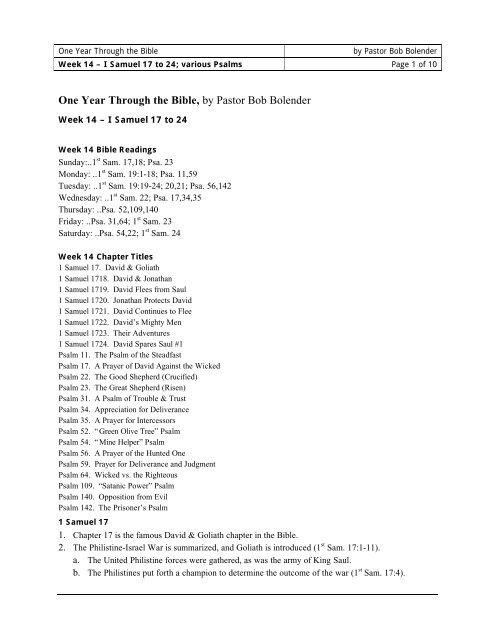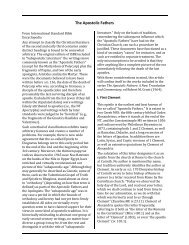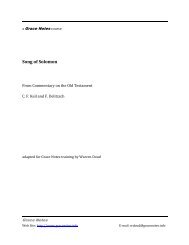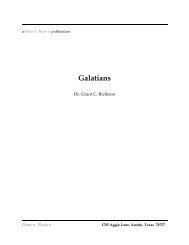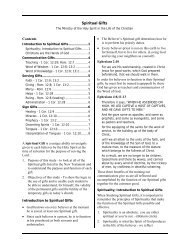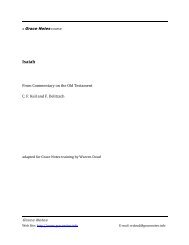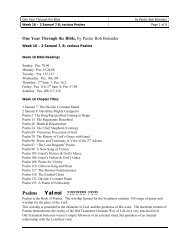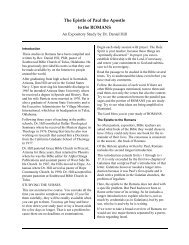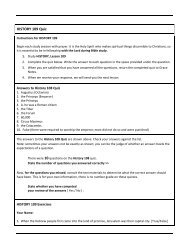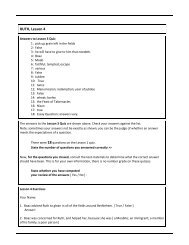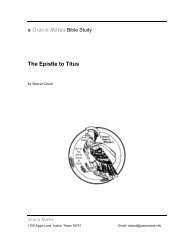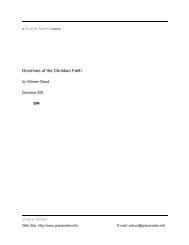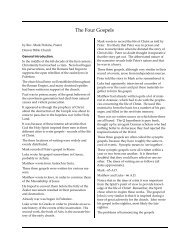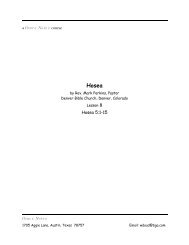One Year Through the Bible, by Pastor Bob Bolender - Grace Notes
One Year Through the Bible, by Pastor Bob Bolender - Grace Notes
One Year Through the Bible, by Pastor Bob Bolender - Grace Notes
Create successful ePaper yourself
Turn your PDF publications into a flip-book with our unique Google optimized e-Paper software.
<strong>One</strong> <strong>Year</strong> <strong>Through</strong> <strong>the</strong> <strong>Bible</strong><br />
<strong>by</strong> <strong>Pastor</strong> <strong>Bob</strong> <strong>Bolender</strong><br />
Week 14 – I Samuel 17 to 24; various Psalms Page 1 of 10<br />
<strong>One</strong> <strong>Year</strong> <strong>Through</strong> <strong>the</strong> <strong>Bible</strong>, <strong>by</strong> <strong>Pastor</strong> <strong>Bob</strong> <strong>Bolender</strong><br />
Week 14 – I Samuel 17 to 24<br />
Week 14 <strong>Bible</strong> Readings<br />
Sunday:..1 st Sam. 17,18; Psa. 23<br />
Monday: ..1 st Sam. 19:1-18; Psa. 11,59<br />
Tuesday: ..1 st Sam. 19:19-24; 20,21; Psa. 56,142<br />
Wednesday: ..1 st Sam. 22; Psa. 17,34,35<br />
Thursday: ..Psa. 52,109,140<br />
Friday: ..Psa. 31,64; 1 st Sam. 23<br />
Saturday: ..Psa. 54,22; 1 st Sam. 24<br />
Week 14 Chapter Titles<br />
1 Samuel 17. David & Goliath<br />
1 Samuel 1718. David & Jonathan<br />
1 Samuel 1719. David Flees from Saul<br />
1 Samuel 1720. Jonathan Protects David<br />
1 Samuel 1721. David Continues to Flee<br />
1 Samuel 1722. David’s Mighty Men<br />
1 Samuel 1723. Their Adventures<br />
1 Samuel 1724. David Spares Saul #1<br />
Psalm 11. The Psalm of <strong>the</strong> Steadfast<br />
Psalm 17. A Prayer of David Against <strong>the</strong> Wicked<br />
Psalm 22. The Good Shepherd (Crucified)<br />
Psalm 23. The Great Shepherd (Risen)<br />
Psalm 31. A Psalm of Trouble & Trust<br />
Psalm 34. Appreciation for Deliverance<br />
Psalm 35. A Prayer for Intercessors<br />
Psalm 52. “Green Olive Tree” Psalm<br />
Psalm 54. “Mine Helper” Psalm<br />
Psalm 56. A Prayer of <strong>the</strong> Hunted <strong>One</strong><br />
Psalm 59. Prayer for Deliverance and Judgment<br />
Psalm 64. Wicked vs. <strong>the</strong> Righteous<br />
Psalm 109. “Satanic Power” Psalm<br />
Psalm 140. Opposition from Evil<br />
Psalm 142. The Prisoner’s Psalm<br />
1 Samuel 17<br />
1. Chapter 17 is <strong>the</strong> famous David & Goliath chapter in <strong>the</strong> <strong>Bible</strong>.<br />
2. The Philistine-Israel War is summarized, and Goliath is introduced (1 st Sam. 17:1-11).<br />
a. The United Philistine forces were ga<strong>the</strong>red, as was <strong>the</strong> army of King Saul.<br />
b. The Philistines put forth a champion to determine <strong>the</strong> outcome of <strong>the</strong> war (1 st Sam. 17:4).
<strong>One</strong> <strong>Year</strong> <strong>Through</strong> <strong>the</strong> <strong>Bible</strong><br />
<strong>by</strong> <strong>Pastor</strong> <strong>Bob</strong> <strong>Bolender</strong><br />
Week 14 – I Samuel 17 to 24; various Psalms Page 2 of 10<br />
1) µyIn"Beh'Avyai iysh-habbenayim. ÷yIB' bayin #996 : an interval, space between.<br />
2) Goliath. ty"l]G: golyath #1555 : splendour() conspicuous (). hl;G: galah #1540 : to uncover, remove, reveal,<br />
carry to exile.<br />
3) Gath was one of <strong>the</strong> five Philistine cities (with Ekron, Ashdod, Ashkelon, and Gaza), and <strong>by</strong> this time<br />
was considered <strong>the</strong> capital of <strong>the</strong> five cities (1 st Sam. 6:17).<br />
4) Six cubits and a span. 117” tall. 9’9”<br />
5) Heavy armor, 5,000 shekels of bronze. Over 126 pounds!<br />
c. The challenge is issued daily for 40 days (1 st Sam. 17:8-11,16).<br />
1) The result of <strong>the</strong> single combat between <strong>the</strong> Philistine champion (Goliath), and any champion Israel<br />
cared to send forth would be <strong>the</strong> enslavement of <strong>the</strong> defeated side (1 st Sam. 17:9).<br />
2) This custom was known among <strong>the</strong> Greeks, and Homer’s Iliad contains <strong>the</strong> famous account of<br />
Achilles’ victory over Hector. Apparently <strong>the</strong> Hittites of Asia Minor also practiced individual combat<br />
to a limited extent. 1<br />
3) Parallels to <strong>the</strong> single combat between two parties to determine <strong>the</strong> outcome of a larger conflict have<br />
been identified in <strong>the</strong> Iliad (Paris and Menelaus in Book 3, Hector and Ajax in Book 7), in <strong>the</strong><br />
Egyptian Story of Sinuhe (de Vaux 1971: 129; but see Hoffner 1968: 220–21), in <strong>the</strong> Hittite Apology<br />
of Hattushilish III (Hoffner 1968: 221–25), and in <strong>the</strong> Hebrew <strong>Bible</strong> (2 Sam 2:12–17, in which <strong>the</strong><br />
battle is between two groups of soldiers equal in number). 2<br />
d. Israel fails to take up <strong>the</strong> challenge for 40 days.<br />
1) King Saul does not take up <strong>the</strong> challenge, even though he has been anointed <strong>by</strong> <strong>the</strong> Lord to judge<br />
(deliver) Israel.<br />
2) Jonathan does not take up <strong>the</strong> challenge. He is mentioned in 1 st Sam. 18:1 as being present, and must<br />
have been under direct orders from his fa<strong>the</strong>r to not go into battle.<br />
3) David’s bro<strong>the</strong>rs were present, and also failed to step forward <strong>by</strong> faith (1 st Sam. 17:13).<br />
4) David is not present, as his duties had placed him among his fa<strong>the</strong>r’s flocks (1 st Sam. 17:15).<br />
3. David finds out about <strong>the</strong> challenge, and cannot believe that nobody has gone forward to kill <strong>the</strong><br />
uncircumcised Philistine (1 st Sam. 17:12-30).<br />
a. His work-assignment as King Saul’s minstrel was a part-time job, with extended time off to care<br />
for Jesse’s flock (1 st Sam. 17:12,15).<br />
1) We don’t have specific information regarding David’s age, but it appears that he is too young for<br />
regular military service under King Saul.<br />
2) We can estimate an age of 10 for David’s anointing <strong>by</strong> Samuel (1 st Sam. 16:13).<br />
3) We can estimate an age of 11 for David’s musical ministry in Saul’s court (1 st Sam. 16:21-23).<br />
4) We can estimate an age of 12 for David when he kills <strong>the</strong> lion and <strong>the</strong> bear (1 st Sam. 17:34-36).<br />
5) We can estimate an age of 13 for David when he kills Goliath (1 st Sam. 17:50,51).<br />
6) We can estimate an age of 14-16 for his marriage to Michael (1 st Sam. 18:27).<br />
b. Jesse sends David to his bro<strong>the</strong>rs with provisions for <strong>the</strong>m and <strong>the</strong>ir commander<br />
(1 st Sam. 17:17-19).<br />
c. David overhears some Hebrew soldiers speaking of <strong>the</strong> reward Saul was offering for possible<br />
champions to fight <strong>the</strong> giant (1 st Sam. 17:20-27).<br />
1 Elwell, W. A. (1996, c1989). Vol. 3: Evangelical commentary on <strong>the</strong> <strong>Bible</strong>. Baker reference library (1 Sa<br />
17:1). Grand Rapids, Mich.: Baker Book House.<br />
2 Freedman, D. N. (1996, c1992). The Anchor <strong>Bible</strong> Dictionary (Vol. 2, Page 1073). New York:<br />
Doubleday.
<strong>One</strong> <strong>Year</strong> <strong>Through</strong> <strong>the</strong> <strong>Bible</strong><br />
<strong>by</strong> <strong>Pastor</strong> <strong>Bob</strong> <strong>Bolender</strong><br />
Week 14 – I Samuel 17 to 24; various Psalms Page 3 of 10<br />
d. David’s bro<strong>the</strong>rs are angry at his presence, and accuse him of seeking glory from a wicked heart<br />
(1 st Sam. 17:28-30).<br />
4. When it comes to Saul’s attention that David is willing to kill <strong>the</strong> giant, he does not believe it is<br />
possible for David to win (1 st Sam. 17:31-37).<br />
a. David convinces King Saul that he is not unaccustomed to danger.<br />
b. David recounts his experience without boasting about it— simply describing <strong>the</strong> facts.<br />
c. In <strong>the</strong> eyes of Saul’s servants, David is a mighty man of valor (1 st Sam. 16:18), but in Saul’s eyes,<br />
he’s but a youth (1 st Sam. 17:33).<br />
5. David’s confidence in <strong>the</strong> Lord convinces Saul that he is <strong>the</strong> one to fight <strong>the</strong> giant (1 st Sam. 17:37b).<br />
a. Saul provides David with his own armor and weapons (1 st Sam. 17:38).<br />
b. David felt uncomfortable with <strong>the</strong> untested (and ill-fitting) equipment, so he went forward with<br />
his shepherd’s weaponry (1 st Sam. 17:39,40).<br />
c. David ga<strong>the</strong>red five smooth stones (1 st Sam. 17:40) because Goliath had four giant sons<br />
(2 nd Sam. 17:15-22; 1 st Chr. 20:4-8), and David intended to kill <strong>the</strong>m all.<br />
6. Goliath’s viewpoint of David from <strong>the</strong> standpoint of a pagan unbeliever matched Saul’s viewpoint of<br />
David from <strong>the</strong> standpoint of a reversionistic believer (1 st Sam. 17:41-44).<br />
7. David approached <strong>the</strong> giant with <strong>the</strong> faith that <strong>the</strong> battle is <strong>the</strong> Lord’s (1 st Sam. 17:45-47).<br />
a. Goliath’s weapons were according to <strong>the</strong> flesh (1 st Sam. 17:45a; 2 nd Cor. 10:4).<br />
b. David’s weapons were divinely powerful for <strong>the</strong> destruction of fortresses (1 st Sam. 17:45b;<br />
2 nd Cor. 10:4).<br />
c. David’s goal is to glorify <strong>the</strong> Lord God of Israel in <strong>the</strong> eyes of <strong>the</strong> unbelievers, and in <strong>the</strong> eyes of<br />
Israel (1 st Sam. 17:46,47).<br />
8. The Lord used David’s shepherding weapons to achieve <strong>the</strong> victory (1 st Sam. 17:48-50a), and <strong>the</strong><br />
pagan’s weapons to achieve his own execution (1 st Sam. 17:50b,51).<br />
9. The Philistines defy <strong>the</strong>ir obligation to become enslaved to Israel, and run in retreat (1 st<br />
Sam. 17:52-54).<br />
a. David kept Goliath’s head, and weapons for souvenirs.<br />
b. The weapons will end up in <strong>the</strong> tabernacle at Nob (1 st Sam. 21:9).<br />
10. Although Saul had greatly benefited from David’s prior musical ministry, he never bo<strong>the</strong>red to find<br />
out David’s family, or <strong>the</strong> advantages he might find <strong>by</strong> an alliance with <strong>the</strong> house of Jesse<br />
(1 st Sam. 17:55-58).<br />
1 Samuel 18<br />
1. Saul & Jonathan reacted differently to David’s victory over Goliath (1 st Sam. 18:1,2).<br />
a. Jonathan found a fellow believer with a matching soul-capacity love for <strong>the</strong> Lord (1 st Sam. 18:1).<br />
b. Saul found a mighty man of valor that he could attach to his staff (1 st Sam. 18:2; cf. 14:52).<br />
c. Jonathan gave gifts to David, and exalted David over his own claim as crown-prince<br />
(1 st Sam. 18:3,4).<br />
d. Saul used David, and sent him various places to win battles that Saul could not win<br />
(1 st Sam. 18:5).<br />
2. David’s military success produced a jealousy on <strong>the</strong> part of King Saul (1 st Sam. 18:6-9).<br />
3. Saul’s continued slide into reversionism was marked <strong>by</strong> <strong>the</strong> greater impact that his demonic affliction<br />
was permitted to have (1 st Sam. 18:10,11).
<strong>One</strong> <strong>Year</strong> <strong>Through</strong> <strong>the</strong> <strong>Bible</strong><br />
<strong>by</strong> <strong>Pastor</strong> <strong>Bob</strong> <strong>Bolender</strong><br />
Week 14 – I Samuel 17 to 24; various Psalms Page 4 of 10<br />
a. As a believer, Saul cannot be possessed <strong>by</strong> demons (Lk. 11:21-26; 1 st Cor. 6:19; 1 st Jn. 4:4), but<br />
he can certainly be obsessed <strong>by</strong> <strong>the</strong>m, as he submits to <strong>the</strong>ir influence (1 st Tim. 4:1,2).<br />
b. Saul went through a demonic cycle of anger, fear, & dread (anger+fear).<br />
c. Even dispatching David to <strong>the</strong> frontier didn’t help, as everywhere David served produced even<br />
more victories (1 st Sam. 18:12-16).<br />
4. Saul devises a plot “to snare” David into death at <strong>the</strong> hands of <strong>the</strong> Philistines (1 st Sam. 18:17-30).<br />
a. The bait for Saul’s snare is his daughter’s hand in marriage.<br />
b. David declines Saul’s offer of marriage with Merab, as not being worthy of such a marriage<br />
arrangement (1 st Sam. 18:17-19).<br />
c. Saul’s o<strong>the</strong>r daughter, Michal, actually loves David, so Saul has ano<strong>the</strong>r chance to “snare” his<br />
enemy (1 st Sam. 18:20,21).<br />
d. Saul also allays David’s concerns <strong>by</strong> “only” asking for a dowry of 100 Philistine foreskins<br />
(1 st Sam. 18:22-27).<br />
e. Saul’s efforts are fruitless, however, as David presents <strong>the</strong> king with a double-portion dowry for<br />
his daughter.<br />
1) David is blessed with career success.<br />
2) David is blessed with marital success.<br />
Psalm 23<br />
1. David <strong>the</strong> Shepherd knew Who his true Shepherd was (Ps. 23:1a; Jn. 10:11,14; 1 st Pet. 2:25; 5:4;<br />
Heb. 13:20).<br />
2. <strong>Through</strong> David’s recognition of <strong>the</strong> Lord’s shepherding ministry, he has no want (Ps. 23:1b-3;<br />
34:9,10; Phil. 4:19).<br />
a. The Shepherd provides rest.<br />
b. The Shepherd provides nourishment.<br />
c. The Shepherd turns <strong>the</strong> soul that is headed <strong>the</strong> wrong direction.<br />
d. The Shepherd leads <strong>by</strong> example.<br />
e. The Shepherd does this all for His own glory.<br />
3. The believer focused on <strong>the</strong> Good, Great, and Chief Shepherd can have victory in every circumstance<br />
and detail of life (Ps. 23:4-6).<br />
a. He has confidence in physical danger.<br />
b. He has confidence in spiritual danger.<br />
c. He has confidence in Divine protection.<br />
d. He has confidence in Divine provision.<br />
e. He has confidence in his spiritual-life blessings and service to <strong>the</strong> Lord— both in time and eternity.<br />
1 Samuel 19<br />
1. Saul’s demonic affliction has driven him to <strong>the</strong> point of murder (1 st Sam. 19:1a).<br />
2. Jonathan’s spiritual fellowship with David had become a great delight (1 st Sam. 19:1b). <br />
chaphets #2654 : to delight in, take pleasure in.<br />
3. Jonathan warns David of <strong>the</strong> murder plot, and urges Saul to recognize <strong>the</strong> Lord’s blessings upon him<br />
through David (1 st Sam. 19:2-5).<br />
4. Saul listens to <strong>the</strong> wisdom of Jonathan, and rescinds <strong>the</strong> execution warrant (1 st Sam. 19:6,7).<br />
5. The next Davidic victory drove Saul to murderous anger once again (1 st Sam. 19:8-10).
<strong>One</strong> <strong>Year</strong> <strong>Through</strong> <strong>the</strong> <strong>Bible</strong><br />
<strong>by</strong> <strong>Pastor</strong> <strong>Bob</strong> <strong>Bolender</strong><br />
Week 14 – I Samuel 17 to 24; various Psalms Page 5 of 10<br />
6. Saul has David’s house watched, in order to ambush him in <strong>the</strong> morning, but Michal warns David,<br />
and assists in his escape (1 st Sam. 19:11-17).<br />
a. Michal covers for David with a lie, and provides him with additional time to make his escape.<br />
b. She places a teraphim (household idol) in <strong>the</strong> bed, and tells <strong>the</strong> guards that he is sick<br />
(1 st Sam. 19:13,14).<br />
c. She tells ano<strong>the</strong>r lie to her fa<strong>the</strong>r to cover for her first lie (1 st Sam. 19:15-17).<br />
7. David flees to Ramah, and stays with <strong>the</strong> Prophet Samuel (1 st Sam. 19:18-24).<br />
a. Saul’s repeated messengers will be unable to arrest David (1 st Sam. 19:20,21).<br />
b. Saul himself is unable to lay a hand on <strong>the</strong> Lord’s anointed (1 st Sam. 19:22-24).<br />
Psalm 11<br />
1. David understood that his spiritual fortress was <strong>the</strong> Lord, and <strong>the</strong>refore his soul had no o<strong>the</strong>r place to<br />
flee to, and no need to flee (Ps. 11:1).<br />
2. Although David has physically fled from Saul, his soul was not fleeing in fear.<br />
3. The wicked plan extensively for <strong>the</strong> downfall of <strong>the</strong> righteous (Ps. 11:2).<br />
4. David chose to occupy his mind with <strong>the</strong> heavenly glory of <strong>the</strong> Lord, and <strong>the</strong> Lord’s plan for <strong>the</strong><br />
testing of His servants (Ps. 11:4,5).<br />
5. David chose to occupy his mind with <strong>the</strong> Lord’s ultimate judgment in eternity (Ps. 11:6,7).<br />
Psalm 59<br />
1. Psalm 59 is an Imprecatory Psalm, where David calls for God’s vengeance against his enemies. The<br />
Imprecatory Psalms are: 35, 52, 55, 58, 59, 79, 109, &137.<br />
2. David opens his prayer (psalm) with an expectation of deliverance (Ps. 59:1,2).<br />
a. Deliver me. natsal #5337 : to snatch away, rescue, deliver (Ps. 22:20).<br />
b. Set me high away. (NIV: protect me; NKJV: defend me). sagab #7682 : to be high, to be set<br />
(securely) on high (Ps. 20:1; 69:29; 91:14; 107:41).<br />
c. Save me. yasha‘ #3467 : to deliver, save (Ps. 86:2).<br />
3. David professes <strong>the</strong> innocence of his heart, and describes <strong>the</strong> wickedness of his enemies (Ps. 59:3-7).<br />
4. David enjoys <strong>the</strong> Sovereignty of God, Who laughs at his enemies (Ps. 59:8; 2:4; 37:13).<br />
5. David turns to <strong>the</strong> Lord for strength, and expects <strong>the</strong> Adversaries lies to be manifest for what <strong>the</strong>y are<br />
(Ps. 59:9-15).<br />
6. David understands that spiritual conflict is cause for rejoicing because He provides <strong>the</strong> victory, and<br />
He is entitled to <strong>the</strong> praise (Ps. 59:16,17).<br />
1 Samuel 20<br />
David confronts Jonathan with Saul’s latest murder plot, but Jonathan has no knowledge of Saul’s current<br />
intentions (1 st Sam. 20:1,2).<br />
1. David advises Jonathan on a plan of action, so that Jonathan can discover Saul’s true intentions<br />
(1 st Sam. 20:3-8).<br />
2. Jonathan agrees to David’s plan, and initiates a procedure for surreptitious communication<br />
(1 st Sam. 20:9-11,18-23).<br />
3. Jonathan & David make a covenant with one ano<strong>the</strong>r, that recognizes <strong>the</strong> Lord’s will in anointing<br />
David to replace Saul (1 st Sam. 20:12-17).
<strong>One</strong> <strong>Year</strong> <strong>Through</strong> <strong>the</strong> <strong>Bible</strong><br />
<strong>by</strong> <strong>Pastor</strong> <strong>Bob</strong> <strong>Bolender</strong><br />
Week 14 – I Samuel 17 to 24; various Psalms Page 6 of 10<br />
4. Jonathan puts David’s plan into action, and finds out quite violently what Saul’s intentions are<br />
(1 st Sam. 20:24-34).<br />
5. Jonathan uses his procedure for surreptitious communication, but <strong>the</strong>n works against that plan <strong>by</strong><br />
speaking directly with David (1 st Sam. 20:35-42).<br />
1 Samuel 21<br />
1. David’s flight takes him to Ahimelech <strong>the</strong> priest, at Nob (1 st Sam. 21:1a).<br />
a. Ahimilech was a priest of <strong>the</strong> line of Ithamar, and descended from Eli (1 st Chr. 24:3;<br />
1 st Kgs. 2:26,27).<br />
b. Nob was a town of priests, just north of Jerusalem in Benjamin (Isa. 10:32).<br />
2. Ahimelech is frightened <strong>by</strong> <strong>the</strong> manner in which David was coming to him (1 st Sam. 21:1b).<br />
3. David invents a story (<strong>the</strong> old “secret mission” story) and asks <strong>the</strong> priest for assistance<br />
(1 st Sam. 21:2-9).<br />
4. Doeg <strong>the</strong> Edmonite observes David’s presence, and will be used <strong>by</strong> <strong>the</strong> Adversary to bring about a<br />
great evil (1 st Sam. 21:7; 22:9,10,18,19; Ps. 52).<br />
5. David flees to <strong>the</strong> land of <strong>the</strong> Philistines (1 st Sam. 21:10-15).<br />
a. He intends to offer himself to Achish for service, but <strong>the</strong> Philistine servants recognize him<br />
(1 st Sam. 21:10,11).<br />
b. David acted insanely for <strong>the</strong> purpose of escaping from <strong>the</strong> Philistines (1 st Sam. 21:12-15).<br />
Psalm 56<br />
1. David composes <strong>the</strong> Psalm as an expression of gratitude for <strong>the</strong> Lord’s deliverance from <strong>the</strong><br />
Philistines.<br />
2. Regardless of human (demonic) activity against us, we can rejoice in <strong>the</strong> grace of God (Ps. 56:1).<br />
3. Believers have <strong>the</strong> faith in God’s deliverance, as a provision against fear (Ps. 56:3,4,11).<br />
4. Believers have faith in God’s limits— <strong>the</strong> extent to which we must suffer and cry (Ps. 56:8).<br />
5. Believers must walk in <strong>the</strong> light of life, giving praise to God for each victory over darkness<br />
(Ps. 56:12,13).<br />
Psalm 142<br />
1. Believers may come to <strong>the</strong> point of an overwhelmed soul (Ps. 142:3,6).<br />
2. The answer in <strong>the</strong>se troubled times is a fervent, effective prayer life (Ps. 142:1,2,5).<br />
3. God’s motivation to deliver <strong>the</strong> believer is for <strong>the</strong> fur<strong>the</strong>r glorification of His holy name (Ps. 142:7).<br />
1 Samuel 22<br />
1. David’s return to Israel was also a family reunion (1 st Sam. 22:1).<br />
2. David’s return to Israel was a subject of hope for many who were afflicted <strong>by</strong> Saul’s unrighteous<br />
reign (1 st Sam. 22:2).<br />
3. David secured his family’s care, and <strong>the</strong>n kept himself in <strong>the</strong> geographic will of God<br />
(1 st Sam. 22:3-5).<br />
4. Saul hears of David’s return to Israel, and accuses his entire staff of a conspiracy with his enemy<br />
(1 st Sam. 22:6-8).<br />
5. Doeg proves his carnal allegiance to Saul <strong>by</strong> exposing <strong>the</strong> role Ahimelech played in David’s escape<br />
(1 st Sam. 22:9,10).<br />
6. Saul summons <strong>the</strong> house of Ahimelech for trial (1 st Sam. 22:11-16).
<strong>One</strong> <strong>Year</strong> <strong>Through</strong> <strong>the</strong> <strong>Bible</strong><br />
<strong>by</strong> <strong>Pastor</strong> <strong>Bob</strong> <strong>Bolender</strong><br />
Week 14 – I Samuel 17 to 24; various Psalms Page 7 of 10<br />
a. The charge is conspiracy and treason.<br />
b. The guilt is presupposed.<br />
c. Ahimelech knows nothing about a conspiracy, and testifies to <strong>the</strong> righteousness of David.<br />
7. Saul orders <strong>the</strong> priests’ execution, and Doeg is willing to carry it out (1 st Sam. 22:17-19).<br />
8. Abiathar escapes <strong>the</strong> massacre, and arrives safely into David’s company (1 st Sam. 22:20-23).<br />
Psalm 17<br />
1. David understands <strong>the</strong> importance of prayer during times of affliction (Ps. 17:1).<br />
2. David understands that he is accountable to <strong>the</strong> Lord at all times, and has no problem with <strong>the</strong> Lord’s<br />
scrutiny at any time (Ps. 17:2-5).<br />
3. David understands that prayer enables him to take refuge in <strong>the</strong> shadow of <strong>the</strong> Lord’s wings<br />
(Ps. 17:6-12).<br />
4. David understands that <strong>the</strong> wicked may prosper in this life, but <strong>the</strong> rewards of <strong>the</strong> righteous come in<br />
<strong>the</strong> next life (Ps. 17:13-15).<br />
Psalm 34<br />
1. Psalm 34 is an acrostic psalm.<br />
a. There is no verse beginning with w.<br />
b. The surprise comes in Ps. 34:6 (Heb. v.7) with a verse that begins with z: This poor man cried, and<br />
<strong>the</strong> Lord heard him, and saved him out of all his troubles.<br />
c. Since <strong>the</strong> acrostic ends at v.21, instead of v.22, <strong>the</strong> final verse of <strong>the</strong> chapter makes <strong>the</strong> overall<br />
point— David’s gospel message to <strong>the</strong> down-trodden.<br />
2. David has blessings and praise for <strong>the</strong> Lord Who delivered him from <strong>the</strong> Philistines (Ps. 34:1).<br />
3. David will boast in <strong>the</strong> Lord, and allow his failures to instruct o<strong>the</strong>rs (Ps. 34:2,3).<br />
4. David’s <strong>Bible</strong> class was an encouragement to <strong>the</strong> down-trodden that had come to him for hope<br />
(Ps. 34:4-7; 1 st Sam. 22:2).<br />
5. David’s <strong>Bible</strong> class was an exhortation to those down-trodden, to live for <strong>the</strong> Lord, and for His glory<br />
(Ps. 34:8-14).<br />
6. David’s <strong>Bible</strong> class was an exhibition of <strong>the</strong> Lord’s faithfulness towards believers, and <strong>the</strong> Lord’s<br />
righteous judgment against unbelievers (Ps. 34:15-22).<br />
Psalm 35<br />
1. David gives his battle to <strong>the</strong> Lord (Ps. 35:1-8).<br />
2. David looks forward to seeing his prayers answered, although he doesn’t know how long it is going to<br />
take (Ps. 35:9,10,17,18).<br />
3. David examines himself to make certain of his own undeserved suffering, ra<strong>the</strong>r than divine<br />
discipline (Ps. 35:11-16).<br />
4. David asks <strong>the</strong> Lord to thwart <strong>the</strong> conspiracy of <strong>the</strong> wicked (Ps. 35:19-26).<br />
5. David values <strong>the</strong> prayers of o<strong>the</strong>rs on his behalf, and looks forward to corporate worship in<br />
celebration of <strong>the</strong> Lord’s deliverance (Ps. 35:27,28).<br />
Psalm 52<br />
1. Psalm 52 is David’s rebuke of Doeg <strong>the</strong> Edomite.<br />
2. Psalm 52 is God’s rebuke of Satan.
<strong>One</strong> <strong>Year</strong> <strong>Through</strong> <strong>the</strong> <strong>Bible</strong><br />
<strong>by</strong> <strong>Pastor</strong> <strong>Bob</strong> <strong>Bolender</strong><br />
Week 14 – I Samuel 17 to 24; various Psalms Page 8 of 10<br />
3. Psalm 52 is a sad Psalm, because <strong>the</strong> evil man is uprooted (Ps. 52:5), when he could have been a tree<br />
firmly planted (Ps. 52:8,9; 1:3).<br />
Psalm 109<br />
1. The itemized imprecations of this Psalm are <strong>the</strong> most severe in Scripture.<br />
2. The shadow prophecy here finds its fulfillment in Judas Iscariot (Ps. 109:8; Acts 1:20).<br />
3. Psalm 109 was never used in later years for any part of Jewish worship. It has even been regarded <strong>by</strong><br />
some as a magic spell!<br />
4. The Church Age believer needs to understand that rejoicing comes in <strong>the</strong> deliverance of <strong>the</strong> righteous,<br />
and not <strong>the</strong> destruction of <strong>the</strong> unrighteous (Ezek. 33:11).<br />
Psalm 140<br />
1. Believers must guard against attacks from <strong>the</strong> Adversary (Ps. 140:1-3).<br />
2. Believers must guard against being ensnared <strong>by</strong> <strong>the</strong> Adversary (Ps. 140:4,5).<br />
3. The method for <strong>the</strong> believers’ alertness is fervent, effectual prayer (Ps. 140:6-13).<br />
Psalm 31<br />
1. This psalm is a lament, along <strong>the</strong> lines of Job, and <strong>the</strong> grief he experienced (cf. Ps. 31:9-13).<br />
2. David’s grief produces <strong>the</strong> prophetic utterance of Christ (Ps. 31:5; Lk. 23:46).<br />
Psalm 64<br />
1. The verbal warfare of <strong>the</strong> Slanderer and his servants is deadly (Ps. 64:1-6).<br />
2. The Lord’s Word is more powerful than any word <strong>the</strong> Slanderer can devise (Ps. 64:7-10).<br />
1 Samuel 23<br />
1. David is notified of a Philistine raid on <strong>the</strong> Judean city of Keilah (1 st Sam. 23:1).<br />
a. King Saul is doing nothing about <strong>the</strong> raid.<br />
b. The people of Judah are looking for leadership.<br />
c. David inquires of <strong>the</strong> Lord, and receives his instructions to deliver Keilah (1 st Sam. 23:2).<br />
2. David’s men, however, are not privy to <strong>the</strong> Lord’s instructions, and are in need of encouragement<br />
(1 st Sam. 23:3), so David inquires a second time of <strong>the</strong> Lord for <strong>the</strong> benefit of his followers<br />
(1 st Sam. 23:4).<br />
3. The Lord provided for victory, as promised (1 st Sam. 23:5).<br />
4. At this time, Abiathar arrives from Nob, with <strong>the</strong> High Priest’s ephod in hand (1 st Sam. 23:6). David<br />
now has a second witness to <strong>the</strong> Lord’s leading, while Saul is being deprived of Divine witnesses (see<br />
1 st Sam. 28:6).<br />
5. Saul (with human observation) sees David in a trap (Keilah), and moves his armies to surround <strong>the</strong><br />
city (1 st Sam. 23:7,8).<br />
6. David, <strong>by</strong> prophetic knowledge, knows what Saul intends, and verifies it through priestly revelation<br />
in a public manner (1 st Sam. 23:9-12).<br />
7. David & his men <strong>the</strong>n flee to <strong>the</strong> wilderness, and rely upon <strong>the</strong> Lord to keep his movements hidden<br />
from Saul’s daily search (1 st Sam. 23:13,14).<br />
8. Jonathan has no problem finding David, and toge<strong>the</strong>r <strong>the</strong>y enjoy <strong>the</strong>ir final spiritual fellowship in<br />
<strong>the</strong>ir physical life (1 st Sam. 23:15-18).<br />
9. The Ziphites sell out David’s location to Saul (1 st Sam. 23:19-24a).
<strong>One</strong> <strong>Year</strong> <strong>Through</strong> <strong>the</strong> <strong>Bible</strong><br />
<strong>by</strong> <strong>Pastor</strong> <strong>Bob</strong> <strong>Bolender</strong><br />
Week 14 – I Samuel 17 to 24; various Psalms Page 9 of 10<br />
10. The Lord utilizes circumstances in Saul’s kingship to deliver David from Saul’s hand<br />
(1 st Sam. 23:24b-29).<br />
Psalm 54<br />
1. Salvation is according to <strong>the</strong> integrity of God’s own name (Ps. 54:1a).<br />
2. Salvation is <strong>the</strong> outworking of God’s own power (Ps. 54:1b).<br />
3. A great memory verse— God is my helper (Ps. 54:4a). .<br />
‘azar #5826 : to help, support (1 st Sam. 7:12; Job 9:13; Ps. 22:11; 37:40; 107:12; 118:7; Isa. 44:2;<br />
49:8; 50:7,9; 63:5; Dan. 10:13).<br />
Psalm 22<br />
Psalm 22 is <strong>the</strong> prophetic description of <strong>the</strong> crucifixion of Jesus Christ— described <strong>by</strong> David 1,000 years<br />
before-hand.<br />
No known incident in David’s life matches <strong>the</strong> description of this psalm.<br />
This psalm includes no confession of sin whatsoever.<br />
This psalm includes no imprecation against his enemies.<br />
Psalm 22 is quoted in <strong>the</strong> New Testament in a variety of places:<br />
Ps. 22:1 = Matt. 27:46; Mk. 15:34<br />
Ps. 22:7 = Matt. 27:39; Mk. 15:29<br />
Ps. 22:7,8 = Lk. 23:35,36<br />
Ps. 22:8 = Matt. 27:43<br />
Ps. 22:15 = Jn. 19:28<br />
Ps. 22:18 = Matt. 27:35; Mk. 15:24; Lk. 23:34; Jn. 19:24<br />
Ps. 22:22 = Heb. 2:12<br />
Ps. 22:23 = Rev. 19:5<br />
Ps. 22:28 = Rev. 11:15; 19:6<br />
In addition to <strong>the</strong> above quotations, <strong>the</strong> description of this psalm is so vivid it can only have reference to a<br />
crucifixion experience (Ps. 22:16).<br />
David has no recorded literal crucifixion experience.<br />
Yet this passage records a (visionary) crucifixion experience.<br />
As Ezekiel was taken out of his body for spiritual experiences (Ezek. 8-11; 40-48), <strong>Pastor</strong> <strong>Bob</strong><br />
believes that David experienced <strong>the</strong> cross in a similar manner.<br />
The conclusion to <strong>the</strong> psalm speaks of resurrection and glory— <strong>the</strong> cross is not <strong>the</strong> end of <strong>the</strong> story<br />
(Ps. 22:25-31).<br />
1 Samuel 24<br />
1. Saul finishes with pursuing <strong>the</strong> Philistines, and returned his attention to hunting David (1 st<br />
Sam. 24:1).<br />
2. Saul needs to “cover his feet” and unknowingly picks <strong>the</strong> cave in which David & his men are<br />
hiding (1 st Sam. 24:3).<br />
3. David’s men are convinced that God was arranging circumstances to fulfill prophecy (1 st Sam.<br />
24:4a).<br />
a. Such a direct prophecy is not revealed in Scripture.<br />
b. God’s promise to David before Keilah was to deliver <strong>the</strong> Philistines into his hand<br />
(1 st Sam. 23:4).
<strong>One</strong> <strong>Year</strong> <strong>Through</strong> <strong>the</strong> <strong>Bible</strong><br />
<strong>by</strong> <strong>Pastor</strong> <strong>Bob</strong> <strong>Bolender</strong><br />
Week 14 – I Samuel 17 to 24; various Psalms Page 10 of 10<br />
c. Jonathan had promised David that David would be <strong>the</strong> next king, but only stated that<br />
Saul’s hand would not be successful against David. He made no mention of David’s<br />
hand against Saul (1 st Sam. 23:17).<br />
4. David responds to <strong>the</strong> urging of his men, but not in a violent manner against Saul<br />
(1 st Sam. 24:4b).<br />
5. Although David clipped off Saul’s robe as proof of his innocence, David’s conscience was<br />
burdened because of what he had done against Saul (1 st Sam. 24:5).<br />
6. David’s conscience does not allow him to stretch out his hand against <strong>the</strong> Lord’s anointed (1 st<br />
Sam. 24:6,12; 26:9,11,16; 2 nd Sam. 1:14,16; Rom. 14:5,22,23).<br />
a. j'yvim; mashiyach #4899 : anointed one, Messiah.<br />
b. Cristov" christos #5547 : anointed one, Christ, Messiah.<br />
7. David followed Saul out of <strong>the</strong> cave, and gave himself up to <strong>the</strong> mercy of <strong>the</strong> Lord (vv.8-15).<br />
8. Saul’s response was of grief and sorrow for what he had done against David, and <strong>the</strong><br />
unrighteousness of his activity (vv.16-21).<br />
David agrees to Saul’s vow, but chose to remain in En-Gedi ra<strong>the</strong>r than return to court at Gibeah (v.22).


